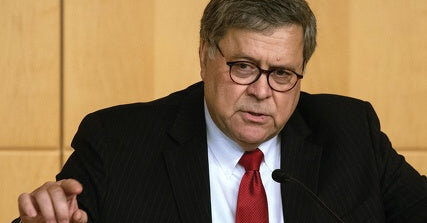Barr offers an extended apologia that tries to square his position on putting people to death with his religious faith. Pope Francis’s revision of the Catholic Church’s Catechism, denouncing the death penalty as “inadmissible because it is an attack on the inviolability and dignity of the person,” sends Barr into a paroxysm of hairsplitting: “The term inadmissible has no established meaning in moral theology, and is certainly too vague and indirect to be read as an attempt to extinguish this vast body of established teaching, even assuming it could be.”
This is a pattern in Barr’s book: He nitpicks his way to desired conclusions by carefully navigating a lawyerly path around finely drawn distinctions, all the while lobbing bomblets at anyone he defines as an enemy. “For all his urbane affect, Obama was still the left-wing agitator who had patiently steered the Democratic Party toward an illiberal, identity-obsessed progressivism,” Barr writes; no doubt actual “left-wing agitators,” who have regularly denounced Obama for centrism, would like to have a word.
Barr’s version of Trump, meanwhile, contains multitudes: The former president may have “an imprecise and discursive speaking style,” even a tendency for “madcap rhetoric,” but Barr also believes Trump has “a deep intuitive appreciation of the importance of religion to the health of our nation.” Barr muses that “the country would have benefited and likely seen more of the constructive, problem-solving style of government that President Trump previewed on election night,” if only he “had been met by a modicum of good faith on the other side.”
By “good faith” Barr is perhaps imagining something like his own generous interpretations of Trump’s behavior, which he goes to great and often tortuous lengths to rationalize in his book. When Barr learned about the consequential phone call between Trump and Volodymyr Zelensky, who was then Ukraine’s President-elect, Barr said he argued for the swift release of the transcript — largely because it showed that Trump, according to Barr, had ultimately done nothing wrong on the call.
Yes, Barr allows, telling Zelensky that American military aid was conditional on a Ukrainian investigation of the Bidens was “foolish,” but “a quid pro quo is inherent in almost all diplomacy.” Besides, even if such an investigation into the president’s opponent would have yielded “political benefits” for Trump, it “would also arguably advance America’s anticorruption agenda,” Barr says. Making room for such intricate rhetorical contortions is partly why this book is nearly 600 pages long.
There are also numerous places where Barr offers what looks at first to be a blizzard of detail but nevertheless makes some strange omissions. He devotes page upon page to the question of voter fraud, which he repeatedly declares to be a real threat, with nary a word about voter suppression. He characterizes the inspector general’s report on the Mueller investigation as “damning” while neglecting to discuss that the same inspector general’s report declared that the F.B.I. had adequate reason to investigate ties between the Trump campaign and Russia. Barr also stays mum on the fact that a bipartisan report from the Republican-led Senate Intelligence Committee concluded the same thing.
By the end of “One Damn Thing After Another,” it’s clear that Barr has something else in common with Trump — a shrewd ability to recognize when certain people are no longer useful for his purposes, and a willingness to dispense with them accordingly. Barr slips in a description of Robert Mueller’s “trembling” hands and “tremulous” voice, wondering if Mueller “might have an illness” — a striking (and expedient) bit of gossip for Barr to float about an old friend. The last chapter has Barr throwing Trump under the bus, albeit gently and with the utmost decorum. Barr laments Trump’s stubborn problems of “tone,” faulting him for “needlessly” alienating “a large group of white-collar suburbanites,” and declares that it’s time to move on from the loser of the 2020 election by recovering “something like the old Reagan coalition.”
But Barr faces a quandary, which is to explain how Republicans can ditch Trump while keeping his fervent base. The result is like the deus ex machina moment in an ancient Greek play, when a hopeless situation is resolved by the sudden appearance of a god on a crane. “The Republicans have an impressive array of younger candidates fully capable of driving forward with MAGA’s positive agenda and cultivating greater national unity,” a wistful Barr insists. “MAGA’s positive agenda” combined with “national unity”? Until I got to that point in his book, I wouldn’t have pegged Barr as someone so thirsty for a fairy-tale ending.





















Discussion about this post